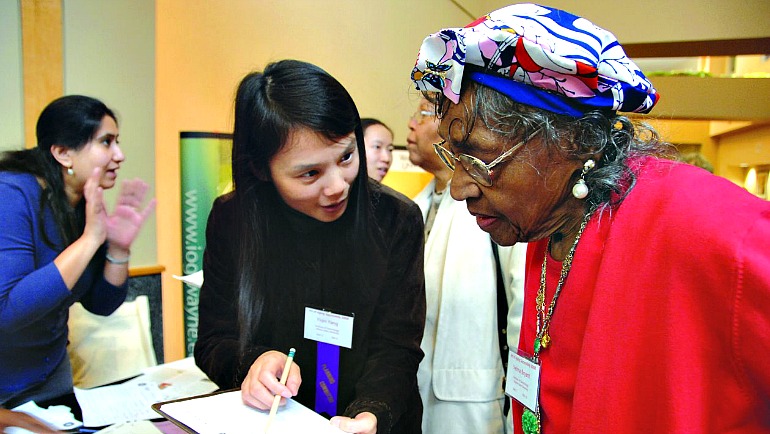
DETROIT – The Michigan Health Endowment Fund awarded more than $370,000 to a pair of Wayne State University programs aimed at improving the well-being of older adults in the area.
Rosanne DiZazzo-Miller, Ph.D., associate professor of occupational therapy in the Eugene Applebaum College of Pharmacy and Health Sciences, received a two-year, $221,992 grant for her project, “Supporting African American Older Adults Who Care for Family Members with Dementia.” Peter Lichtenberg, Ph.D., Distinguished University Service Professor of Psychology and director of the Institute of Gerontology, received an 18-month, $152,231 grant for his project, “Integrating Financial Vulnerability Tools into Geriatric Medical Settings.”
“We're proud to partner with Wayne State in support of two different but equally important projects,” said Health Fund Program Officer Tim Niyonsenga. “While one effort aims to address a racial health disparity and the other is focused on the geriatric care workforce, both are aimed at helping some of our communities' most vulnerable members receive the care and resources they critically need.”
DiZazzo-Miller’s project will design and implement web-based, real-time support and training to African American caregivers, addressing this population’s historical lack of access to culturally relevant information. The goal is that this training will increase caregivers’ knowledge and confidence about providing safe and compassionate care.
“This grant allows me, along with my colleagues, Drs. Pociask and Adamo, the opportunity to create a free online training program that is profoundly needed by family members providing care for people with dementia and related diseases that centers on the most basic, everyday activities of daily living,” says DiZazzo-Miller. “We believe our program can reach countless family caregivers struggling to balance their health and well-being along with their care recipients while partnering with leaders throughout the community.”
Lichtenberg’s project aims to integrate financial vulnerability and capacity tools into geriatric medical care. The program will help protect older adults from financial exploitation through early detection in medical settings.
“Detecting elder financial exploitation is a growing concern for medical professionals and to date they have lacked the tools to do so,” says Lichtenberg. “Our planning grant aims to remedy this and make financial elder abuse a more central part of geriatric primary care.”
Both program grants were part of the Health Fund’s Healthy Aging initiative, which supports projects that improve access to care, allow Michigan residents to age in place, and help communities build a culture of emotional support for older adults.
About the Michigan Health Endowment Fund
The Michigan Health Endowment Fund is a philanthropic foundation that works to improve the health and wellness of Michigan residents while reducing healthcare costs. The Health Fund supports organizations across Michigan. From the urban streetscapes of downtown Detroit all the way to the rural corners of the Upper Peninsula, our partners are doing innovative, evidence-based work to improve the health and wellness of Michigan residents. For more information on the Michigan Health Endowment Fund, visit www.mihealthfund.org.
